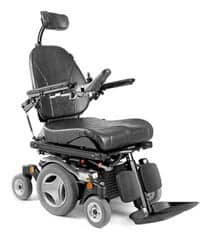The Tennessee State Legislature has enacted legislation establishing “separate benefit” status for a category of specialized power wheelchairs commonly referred to as Complex Rehab Technology (CRT).
The new legislation, which heads to Governor Bill Lee for his approval, will ensure that CRT products receive separate consideration when state Medicaid authorities are proposing adjustments to reimbursement rates or other regulatory changes. The Tennessee Senate affirmed the bill, HB 647, by a 30-0 margin on March 11, following a unanimous 94-0 vote by the Tennessee House the previous week, according to a media release.
“CRT products are designed to meet the unique needs of individuals with disabilities and profound healthcare challenges, supporting positive health outcomes and providing the independence and self sufficiency that would otherwise be challenging or impossible,” notes Bill Mixon, chief executive officer of National Seating & Mobility, a leading supplier of CRT products throughout the US.
“Thanks to this legislation, the individuals and caregivers who depend on CRT can be assured that any budgetary or reimbursement changes covering these essential products will get the special deliberation they deserve.”
The bill has been a 10-month initiative driven by a complex rehabilitation industry coalition including National Seating & Mobility and The American Association for Homecare (AAHomecare), who also engaged Bridge Public Affairs to support the effort.
“The overwhelming, bipartisan support this legislation received in both chambers is a testament to leadership of the bill’s primary sponsors, Sen. Bo Watson and Rep. Darren Jernigan,” Mixon adds. “We also thank TennCare for their support for this policy change.”
AAHomecare provided additional assistance for the advocacy efforts of Tennessee stakeholders by supporting the legislation and plans to partner with suppliers and patient advocates to advance similar initiatives in other states. The Association and Tennessee CRT suppliers expect to continue working with TennCare to add additional safeguards to CRT access once the legislative session has concluded.
“With a growing number of individuals served by Medicaid programs nationwide, it is increasingly important for the CRT community to work with state legislators and healthcare agencies to ensure sustainable reimbursement rates and sound regulatory policies,” AAHomecare President & CEO Tom Ryan remarks.
“We need to make sure that state policymakers everywhere understand that CRT improves quality of life and clinical outcomes for Medicaid patients, while also saving money by reducing costly hospitalizations, as well as lessening the need for nursing home care and other inpatient stays.”
[Source(s): National Seating & Mobility, The American Association for Homecare]
Legislation Establishing 'Separate Benefit' for CRT Passes Unanimously in Tennessee





